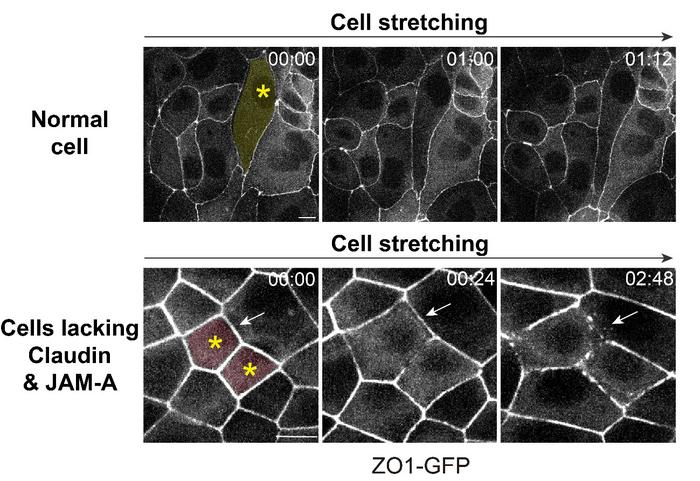Our body consists of ~30 trillion cells. These cells need to tightly attach to each other to maintain the integrity of our body. However, we are constantly exposed to mechanical stress, which continuously challenges the integrity of our bodies. How are cells able to resist mechanical force to maintain the integrity of our body? Why doesn’t our body fall apart when we fall down on the street or when the guts move to digest the food? The secret lies in the cell-to-cell adhesion apparatus that keeps our cells together.

Credit: Tetsuhisa Otani
Our body consists of ~30 trillion cells. These cells need to tightly attach to each other to maintain the integrity of our body. However, we are constantly exposed to mechanical stress, which continuously challenges the integrity of our bodies. How are cells able to resist mechanical force to maintain the integrity of our body? Why doesn’t our body fall apart when we fall down on the street or when the guts move to digest the food? The secret lies in the cell-to-cell adhesion apparatus that keeps our cells together.
Cells hold on to each other through junctions that serve to connect the neighboring cells. At least three types of junctions are known: tight junctions, adherens junctions, and desmosomes. Previous studies have shown that adherens junctions and desmosomes play critical roles in maintaining the integrity of our body. However, the roles of tight junctions in resisting mechanical stress have not been demonstrated to date.
One reason that hindered the attempts to understand the roles of tight junctions was that it had been difficult to specifically and completely eliminate its activity due to the overlapping functions of its key constituents. A few years ago, the research group succeeded in generating an epithelial cell line that specifically and completely lacks tight junction membrane proteins claudins and JAM-A, and demonstrated that these cells completely lack tight junctions.
In carefully examining these cells, the researchers found something bizarre. While normal cells are always connected to each other by a continuous belt of cell-to-cell junctions, sporadic disruption and fragmentation of cell-to-cell junctions were observed in these cells. “We had never seen something like this before and became curious about this issue”, said the first author Thanh Phuong Nguyen.
The researchers decided to take a movie to find out how the junctions become broken in these cells and found that the junctions fractured when the cells were stretched. The research group further showed that tight junction membrane proteins regulate the conformation change of a protein called ZO-1 in response to mechanical force, suggesting that this mechanosensor is important for cells to resist mechanical stress.
Mikio Furuse, the leading scientist of the study says “This study shows that tight junctions in addition to adherens junctions and desmosomes are important for cells to resist mechanical stress. An interesting question is why we need so many junctions to resist force, and how these junctions collaborate to provide mechanical resistance. We would like to tackle these issues in the future.”.
Journal
Journal of Cell Biology
DOI
10.1083/jcb.202307104
Method of Research
Experimental study
Subject of Research
Cells
Article Title
Tight junction membrane proteins regulate the mechanical resistance of the apical junctional complex.




